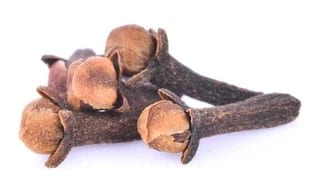

The symptoms of a dog with a clove allergy typically involve skin irritation, itchy red bumps, and/or crusty/scaly patches on the skin. Breathing difficulty or coughing can occur in more severe cases. Vomiting and/or diarrhea may also be present.
The cause of the allergy is typically the inhalation of clove essential oils or smoke, or direct contact with clove oil or leaves of the Eugenia caryophyllata plant. In most cases, the dog experiences an abnormal immune reaction to clove oil or smoke, which causes an inflammatory response in the skin that results in the associated symptoms.
The diagnosis of a clove allergy in a dog usually involves a physical examination by a veterinarian. The vet may also ask questions about the dog’s history, when the symptoms started, and whether any changes were seen in the dog’s diet or environment recently. A skin or blood test may be recommended in order to determine if there is an allergic reaction to clove or another irritant. Depending on the severity of the symptoms, the vet may recommend a course of treatment to manage the allergy and reduce the number of symptoms experienced by the dog.
A clove allergy in dogs can be quite serious if left untreated and can lead to difficulty breathing, anaphylactic shock, and even death in some cases. The mortality rate for a clove allergy that remains untreated is not known, but it is considered potentially life-threatening.
The treatment for dogs with a clove allergy involves avoiding contact with clove products, and managing the symptoms with topical remedies or oral medications as prescribed by a veterinarian. The use of topical antihistamines on the skin may help reduce the itching and discomfort, while the oral antihistamines can help reduce coughing associated with the allergy. Additionally, eating a hypoallergenic diet and avoiding exposure to allergens may help reduce the severity and frequency of the symptoms.
Prevention methods for clove allergies in dogs include avoiding the use of fragrances, incense, candles and potpourri that contain clove oil; frequently washing the animal’s bedding to remove any traces of clove oil; and removing any foods that contain clove from the pet’s diet. Additionally, if the dog is exposed to areas where clove is used, such as public places, keeping the potential allergen away from the dog and using topical products such as anti-itch or anti-inflammation creams may help to reduce the reaction.
Dog allergies are not contagious, so they cannot spread from one dog to another, or to people. However, some people may develop human allergies to the same substances that can trigger reactions in a dog, such as dust, pollen, flea bites or shampoos.
Home remedies that can be useful in managing a clove allergy include using topical ointments, giving the dog Benadryl, limiting exposure to the allergen, and for more severe cases, consulting with a veterinarian about a potential food elimination plan or allergy shots.
It’s important to note that these home remedies are not guaranteed to work and the best option is to consult with a veterinarian if your pet is suffering from allergies. Even if you try home remedies, it’s always recommended to have a professional opinion in order to ensure the best care for your pet.
Some of the dog breeds that are vulnerable to a clove allergy include Bull Terriers, English Bulldogs, French Bulldogs, Pugs, and Golden Retrievers. These particular breeds may suffer from allergic reactions to cloves, or clove oil, which is commonly used as an ingredient in flavoring and perfumes. Symptoms of this type of allergy may include sneezing, body itching, skin rashes, and paw-licking. In more severe cases, dogs might suffer from difficulty in breathing or develop breathing problems. If your dog is experiencing any of these symptoms, it is recommended that you take them to the vet right away.
Have you ever had to deal with a clove allergy in your dog? How did they respond to the symptoms? How did you feel as you managed the process?
The experience of caring for a pet with allergies can be a difficult one. It’s important to remember that the desire to help your dog—despite the difficulties—is a testament to your greatest loving care. As a fellow pet parent, we wish you all the best in finding the best solutions and providing the most supportive environment for your pet.